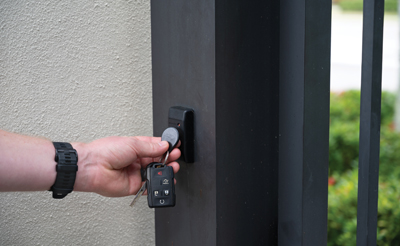
Respond and React
Are You Forgetting This Important Step in Your Security Plan?
By Brie Shouppe / Published September 2022

The access management and security industry rightfully focuses on preventive measures and deterrent methods for communities. This emphasis on prevention is also in line with any community’s ultimate security goal—keep unwanted visitors, trespassers, and burglars out of the neighborhood and its amenities. The only problem with this is when a security plan becomes disconnected, focusing heavily on the first part of the plan to prevent any and all things from happening and forgetting that responding to a security issue and/or using evidence is just as important.
These days, reality seems to hit us on the community Facebook page with a post about stolen pool furniture or on the Nextdoor website and app “where you can get local tips, buy and sell items…” and learn about vandalism in the fitness center. Perhaps the news hasn’t made its way to social media just yet, but as an on-site property manager, you arrive at the clubhouse early on a Monday only to find the entryway TV has been removed from the wall and is now gone. Could these occurrences have been prevented with the right system to deter and detect this type of activity? It is highly likely, but even then, you can’t prevent everything. The better question now is, how will you respond?
Any effective community security plan starts with prevention and detection, but it doesn’t stop there. The next step is response, and the response looks a little different for every community and its different systems—with the point being, though, that there is a response and reaction.
If the community utilizes any type of security system, whether it’s camera systems or access control devices, you have a starting point to respond to incidents. Utilize video footage and/or data records to find out more about the incident, or ask your security provider to assist in recovering that information (if that is a service the association has). Share that information with the local authorities, online with community members, or directly with the responsible parties. By establishing a position that reacts to hold those responsible accountable, you are actually deterring future similar behaviors and incidents.
 What if the issue isn’t at an amenity but rather a gated entrance? One common frustration that gated communities face is related to tailgating and gate strikes. If gate strikes are a frequent and costly nuisance at a neighborhood, it could be that there is little (if any) response to the incidents. With a few strategically placed cameras, a community has a favorable chance of identifying the culprit, but they have to use that evidence and respond. Respond by filing a police report and by contacting the individual and providing the evidence. Not only do communities recoup damage costs in doing so, but word of this type of reaction spreads. It is a reaction that ultimately serves as a deterrent.
What if the issue isn’t at an amenity but rather a gated entrance? One common frustration that gated communities face is related to tailgating and gate strikes. If gate strikes are a frequent and costly nuisance at a neighborhood, it could be that there is little (if any) response to the incidents. With a few strategically placed cameras, a community has a favorable chance of identifying the culprit, but they have to use that evidence and respond. Respond by filing a police report and by contacting the individual and providing the evidence. Not only do communities recoup damage costs in doing so, but word of this type of reaction spreads. It is a reaction that ultimately serves as a deterrent.
For communities without any type of video surveillance or access management system, the best reaction to an incident is to invest in the right solution. If you’re continuously experiencing issues at the community pool, clubhouse, sports courts, or gates but not looking for effective methods to stop the activity, then you’re not responding to your situation. Just like word spreads when a community does react, it also spreads when a neighborhood does not.
The more you respond to a situation at your community, the more you are able to prevent it in the future. Utilize the system and/or services employed at your community to appropriately react to incidents, and let the residents and community members know about it. Keep them informed about how the systems in place benefit the community and are not solely for prevention. The investment a community makes should do more than prevent or detect incidents. It should provide the association with information and methods to respond and acquire evidence to properly secure the association, its amenities, and its assets.
Brie Shouppe
Director of Marketing and Business Development, Envera Systems
Brie Shouppe is the director of marketing and business development for Envera Systems. She manages the marketing team and works closely with all of Envera’s departments to provide information, education, and best-in-class service for the communities that Envera secures. Envera Systems is an all-inclusive security provider that focuses on the unique needs of communities through technology-based solutions. Using virtual guards located at Envera’s operating center, Envera is able to verify visitors at entrances, monitor video, manage community databases, and more. For more information, contact (855) 380-1274 or www.EnveraSystems.com.




